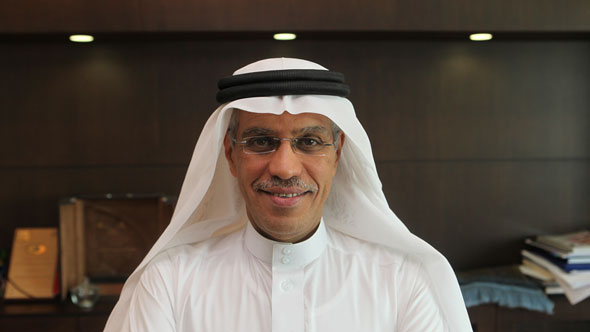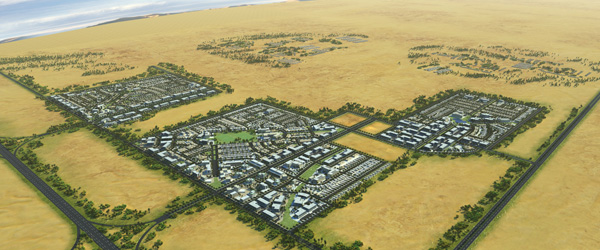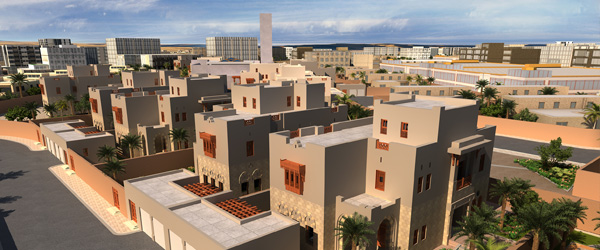Saudi Real-Estate Sector Grew Substantially says Saudi Real Estate Company – Al Akaria
The real estate sector in Saudi Arabia has been one of the major economic supports for the economy of the country for at least the last two decades. The outlook for the real-estate sector is positive. There will be tremendous growth. Within the last three years, there was almost 300% growth in the real estate market, and in projects and development in general.
Interview with Dr. Fahad A. M. Al Said, CEO of Al Akaria

What is your assessment of the real estate sector in Saudi Arabia and the outlook?
The real estate sector in Saudi Arabia has been one of the major economic supports for the economy of the country for at least the last two decades. The outlook for the sector is positive. There will be tremendous growth. Within the last three years, there was almost 300% growth in the real estate market, and in projects and development in general.
It’s a very flourishing sector of the economy, driven by three major factors: first, a very stable political system. Second, a highly growing economy driven by oil production and oil prices. Third, a growing population that creates a genuine demand, i.e. by Saudis. In Saudi Arabia today, there are more than 20 million Saudis and almost 13 million expats, so the demand is genuine. These three factors make the real estate market in Saudi Arabia in general, be it investment or development, grow and it will continue to grow at least for the coming ten years.
As part of our strategy, 2 billion riyal in projects have been just approved. This is just the tip of the iceberg because there are many projects, be it all by Akaria or in partnership with other private and public sectors. Once it is approved by the management, it will be announced to the public.
Do you think the market is undervalued or overvalued? You mentioned that housing and real estate should be major strategic efforts.
Real-estate in the kingdom is undervalued. On a comparative basis between the real estate market, prices, and investments in Saudi Arabia and any other place in the world, starting from the neighboring GCC, then the Middle East and the world in general, real-estate is undervalued. That is why, for example, the prices have tripled. If you bought real estate in 2010 for 1 dollar, today you will sell it for 3 dollars. It is still undervalued.
One of the major issues in Saudi Arabia is the purchasing power of the young people. Do you feel that this issue is being addressed?
The problem is not only the purchasing power of the young people, it’s the number of young people. Saudi Arabia is one of the youngest countries in the world; almost 60 to 70% of the population is below the age of 25 and that creates tremendous pressure on the economy and the infrastructure, be it on education. Housing and real estate is part of that. The new generation needs a place to live, work, and also a place for entertainment.
During our numerous interviews, we heard many criticisms that these housing projects are not going on schedule and they are being delayed. Nothing has been built. Do you feel that is the situation in the market? The government dedicated billions to construct new units but it’s not enough, even now.
The number one formula you have to understand in Saudi Arabia is patience. The kingdom is attempting a very ambitious plan for the reform of the public and private sector. These reforms are being slowly implemented. The observers are critical of the speed of implementation, but steady progress is visible. I call them camel steps – slow but confident.
This demand of course creates many investment opportunities for the private sector. How are you capitalizing on these opportunities?
A real estate developer always has to be one step ahead of everyone, because any real estate project needs at least three to five years to accomplish. As a result, you have to think three to five years ahead of people. For example, 10 years ago, there was a high demand for office space, and Akaria supplied the market with first class office space. Now the shortage is in the housing sector and the company already started building housing projects three or four years ago. Akaria has almost 13 million square meters all over Saudi Arabia, which is being developed now.
This year, for 2014, was the announcement of a project consisting of about 1500 units, which will be followed by much bigger projects. These will be announced once they are approved through the appropriate channels.
In terms of the value of investments being put into building projects around the kingdom, do you have any statistics on that?
For the last few years, the signed development projects in Saudi Arabia averaged 60 billion US dollars a year; this is just the signed projects, not the planned ones. This year, almost 60 billion US dollars in projects have been signed, i.e. are under construction. We have a very ambitious plan in Saudi Arabia, in both the private and public sector on the backdrop of the genuine demand of the population. The population growth climaxed at 6.4% in the 1980s and dropped to 1.9% in 2013 increasing from 5 to 8 million in the 1980s, to the current population of 30 million. That, of course, requires a lot of development supported by the growing economy, i.e. oil prices and production, and of course the stable political system that looks ahead for any development.
In the 1970s Saudi Arabia experienced the similar macroeconomic picture. The country had its first tremendous boom in the 1970s, marked by a high amount of development in Saudi Arabia. The place we are in now, in 1976 when Akaria started, was the middle of the desert. Now it’s the middle of Riyadh. That applies to every urban center. Now, Saudi Arabia is in the midst of another boom that started in 2005 to 2006 and will continue for another ten years, which will require infrastructure, superstructure and projects. Residential, commercial, recreational real-estate will be needed to satisfy the demand. There is almost 60 billion US dollars this year just in signed projects.
What makes you one of the leading real estate companies in Saudi Arabia?
Akaria, established in 1976, was the first real estate company in Saudi Arabia. It continued to have the word “first” throughout its history. It’s the first IPO’d company, the first mall ever built in the Middle East was built by Akaria, the first mixed-use neighborhood was built by Akaria. Recently, we built the first green building in Saudi Arabia. Akaria is always associated with the word “first”.
Being first means you have to be plan ahead, and this is what Akaria has done within the last three years. That is, we have planned ahead for the genuine demand on housing, recreational, and commercial in general.
The boom in the market is also causing many new entrants into the market, which consequently affects the quality of buildings and thus a lot of angry people have decided to build for themselves instead. What do you feel are the many challenges and how are you trying to address these?
One of the extreme challenges we have right now is localizing the knowledge gained from the international experience. Saudi Arabia has partners from all over the world, international firms that are helping us build during the second boom in Saudi Arabia. The tremendous challenge is that we have a very young population. I think the biggest challenge is to localize the international know-how in Saudi Arabia.
The Saudi riyal can be exchanged anywhere in the world. If you have a Saudi riyal in the U.S., you can go to any bank and have dollars. If you go to United Kingdom, you can exchange it for sterling. If you go to Europe, you can exchange it for euros, and so on. The biggest challenge is that the young Saudis are not competing with Saudis, they are competing internationally. We have to pay attention in educating and training these young kids to be an international currency, not for Saudi Arabia. The competition now is a friend coming from the U.S. or Europe or Asia to work in Saudi; my son has to compete with him, not with another Saudi. This is a tremendous challenge, to prepare the younger Saudis to be an international currency, cashable in any place in the world including Saudi Arabia.
This is more of a Saudi challenge. What about your challenge as a company in the private sector?
My challenge is time. The nature of real estate development is that it takes between three and five years from inception to completion. That takes a minimum of three to five years. Can we make that go faster? That is the challenge. If I finish earlier, with the quality of course, then I can reinforce the word “first” about Akaria.
We are currently doing the first green neighborhoods, first energy-saving neighborhoods – the challenge is to keep the word “first” in Saudi. Time is the challenge. Akaria is always the first and this is the biggest challenge. This is the heritage we have from the founders of this company in 1976. I think the first advice they gave us is “we used to be the first; keep us the first”.
Could you speak about your most iconic project and how different is it from other buildings?
There are three cornerstones for any project done by Akaria. The public knows when Akaria announces a project, it is a first, it is a high-quality one, and is reasonably priced. 
Is Al Akaria only in Saudi or are you thinking about expanding?
The international expansion has been under consideration for the past 10 years. The main reason it has not happened is that our profit margins in Saudi Arabia are higher than abroad. Akaria used to have projects all over the world, from the United States to the GCC to the Arab world. Now the opportunities in Saudi are more mouth-watering than any place in the world and again after we sustain the word “first” in Saudi Arabia.
In terms of your financial situation, you are a listed company so you comply with transparency regulations. What is your strategy for 2014 and 2015 in terms of your financials? Would you like to focus on profitability, growth, or the bottom line?
That is one formula. Profitability and growth are two faces of one coin. Definitely growth is our plan and in just 2014. As part of our strategy, 2 billion riyal in projects have been just approved. This is just the tip of the iceberg because there are many projects, be it all by Akaria or in partnership with other private and public sectors. Once it is approved by the management, it will be announced to the public.
Our plan is ambitious – the demand is very high all over Saudi Arabia. There are no sectors that are’ growing but the priority goes to housing for the simple fact that 70% of the population is below the age of 25. It’s a very challenging task for Akaria to do the three corners of our triangle, which are being first, quality and reasonable price.
What about misconceptions or stereotypes about the market? What in your opinion is the most common stereotype that is not true that people have when it comes to the real estate market?
In Saudi, it would be that there are differences in the requirement of a Saudi and any American, British, Canadian or Chinese person. The requirement is the same. The biggest misconception that exist is about “what Saudis want or like”. The answer to that question is simple: in the globalized world the needs of people in Florida is the same as people in in Buraydah.
The misconception is the Saudi requirement and that the culture is so different that they have to understand it. No, 99.9%, and I say that with great confidence, of the requirements are the same as any place in the world. Yes, there are little things here and there, but the biggest misconception is that Saudi culture is different from the rest of the world, which it is’. Remember that for the last 1400 years, we hosted Mecca and Medina, and Saudis have encountered with every ethnic race, group, and nationality in the world. There is no difference at all. You cannot tell me after 1400 years, that Saudis are different than the Chinese or American or Australian. So the answer is the misconception of culture is the biggest misconception that Saudis are different.
Are you optimistic about the future?
There is evidence to be optimistic. I am extremely optimistic for the three reasons. When I look into the eyes of 70% of the population, the younger generation – boys and girls, I am extremely optimistic. I used to teach at the university for 25 years. I see in their eyes the biggest hope that any person can have in the world.
With the stable political and economic system, I’m sure they will do miracles. I’m sure that Saudi Arabia will be much better ten years from now than it is now, and I have a tremendous trust in the young boys and girls of the young generation that is now in action. Many are abroad studying from Japan to the US. Almost 150,000 young Saudis are studying all over the world. How can I not be optimistic when they come back? This is the result of the King Abdullah Program for Scholarship.